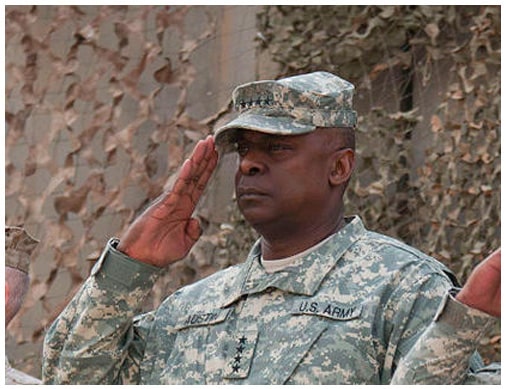Defense Secretary Lloyd Austin made an unannounced trip to Baghdad Tuesday to reiterate U.S. military support for Iraq.
Marking 20 years since the U.S. invasion to oust former Iraqi leader Saddam Hussein, Austin told the press pool traveling with him that U.S. troops are “ready to remain in Iraq,” adding that he had made the trip to “reaffirm the U.S.-Iraq strategic partnership as we move toward a more secure, stable and sovereign Iraq.”
The Defense Secretary is the highest-ranking member of the Biden Cabinet to visit Iraq since the current Administration entered the White House in 2021.
The U.S. ended its combat mission in Iraq in 2021, withdrawing all but a final 2,500 troops there.
Even so, the country has remained an a point of contention between the U.S. and Iran. Iranian-backed militia in Iraq have occasionally targeted U.S. forces and the U.S. embassy in Baghdad. In 2020, the U.S. and Iran came close to full-blown military conflict after a U.S. drone strike killed Iran’s Revolutionary Guards commander General Qassem Soleimani.
“I think that Iraqi leaders share our interest in Iraq not becoming a playground for conflict between the United States and Iran,” a senior U.S. defense official, speaking on condition of anonymity, told Reuters.
And despite the U.S. having ousted the terror group ISIS—also known by the Arabic name “Daesh”—from Iraq six years ago, sleeper cells have continued to launch strikes in both Iraq and Syria.
“We’ll continue working to accomplish this mission together. Through the global coalition to defeat Daesh, we liberated more than 50,000 square kilometers from Daesh and freed more than 4.5 million Iraqis from their cruel grip,” Austin said.
Austin has met with Iraqi Prime Minister Mohammed Shia al-Sudani during his visit and is expected to meet with other Iraqi officials while there.
After Iraq, Austin will return to Amman, Jordan where he began his trip to the Middle East on Sunday to express U.S. commitment to its allies in the region.
PHOTO: Austin as commander of United States Forces-Iraq, December 15, 2011.


